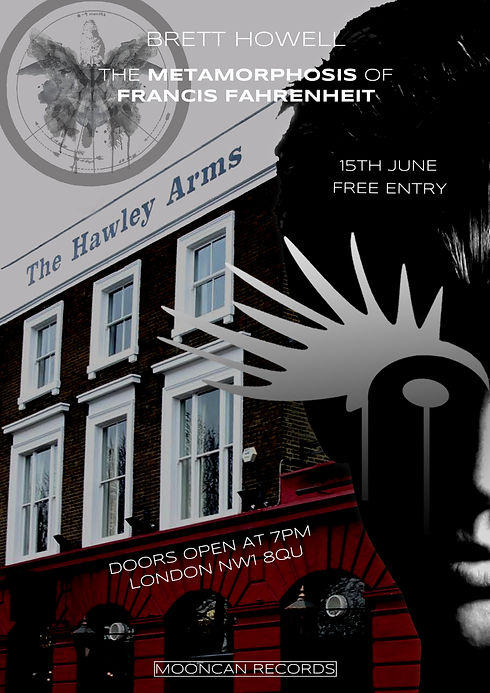.png)


'The Metamorphosis of Francis Fahrenheit' is more than a title, it’s a blueprint, a guide to – and through – the music to come. I stand in a darkened room, a low rumble caressing my skin. The sound builds, and Brett Howell appears; he is still, statuesque, masked. A quasi-gothic façade tinted with mystique, forcing the audience to ask its own questions. Who is this man? What is it he intends to show? He is bare-chested, open, the symbol of the artist painted there, F to backward F, blood-red.
The rhythm is heavy, like a strobe, pulsating with life. Subverting expectation, we hear a story of a man who cannot be changed, even while the world around him breaks and remoulds. The voice is clear and insistent, placing the personal integrity of the artist, whoever he is, at the centre of the art he creates. 'You Can Change the World, But You Can’t Change Me' echoes across the space, opening the show with purpose. Staccato lights flash, revealing the face behind the mask.
The watercolour sounds of 'Wolfgang These Days' mesh with a razor sharp backing track, and the music builds. More questions are posed – what time is it? What year is it? – and the audience is drawn into the mind of the artist, uncertain, progressing through self-expression, always moving. Brett moves precisely, arms like clockwork, mesmerising. A gauntleted hand opens and closes, beckoning us in.
The flow changes again, into the electronic urgency of 'The Boy With X Ray Vision'. Brett utilises a style at once stilted, and yet uniquely expressive. His eyes cut through the audience, an uncompromising stare that it’s hard to look at without flinching. The music pushes forward, refusing to let the crowd rest.
The mood is strange, frantic like a beating heat, and yet introspective. The audience bounces along, heads move. 'The Storm Inside My Heart' opens with symphonic, rolling waves; lyrics spill out, tied together with a raw honesty which pulls the listener into the singer’s plight. As we are told ‘it’s hard to explain’, we already understand. When Brett wants to know if the storm is in his mind or his heart, I the dilemma recalls some of my own perfectly. The song rolls on, the sound of rain sweeps through the room.
The tone switches again, the sinister creep of 'Glass Spiders' crawls its way across my skin. There is the muffled majesty of a megaphone, its shouts paradoxically confusing the voice which utters it. The slow roll and heavy thump of the tune evoke paranoia and an elevated heartbeat. In the heat and darkness of a crowded room, strange bumps seem to draw shudders. Brett scratches his voice across the track, imposing himself with aplomb.
A beat walks in, closely followed by a lounging whistle. The sound evolves, changing and twisting, while Brett stands still. The music begins to roll, and the people move with it. The man before us clasps a hand to his chest, holding it there. Then the voice comes back again. The artist wears a face, but he tells us he is a 'Pretender To The Throne'. The authority of the singer is undermined by his feelings of inadequacy and a lack of belonging. The mask, which provided comfort, has become an instrument of self-oppression. With brutal honesty, our guide admits he just wants to go home.
Blood drips from beneath a hand, from where the heart is. I recall someone telling me that art is suffering, and suffering is art. The liquid flows down skin, mixes with sweat, stains my memory. The eyes of the man cannot avoid casting intensity across the room; they glitter and shine like the jewels painstakingly placed beside them.
The music continues, swelling now, building. Brett turns away, replaces the mask; dark eyes stare out from behind it, as the music slows and merges with the silence. The audience provides applause, as I ask myself, is change the true nature of the man? Or has the artist become subsumed by the need to create? If metamorphosis is change, we have seen it – are seeing it – on the stage tonight.
I step back and sip my drink, the black and red pulse of the show still moving through my mind. The artist, his persona, his characters, have created more questions than answers. I am ok with this; in fact it is what I came for. The music, a cocktail of electronics, drums, haunting tunes and determined vocals, resonates long after the sound has left my ears. The artist has changed the viewer, the metamorphosis is both personal and present. The man who sips his drink is not the man who did so moments before.
Written by Richard Shury - Author of novels & short stories